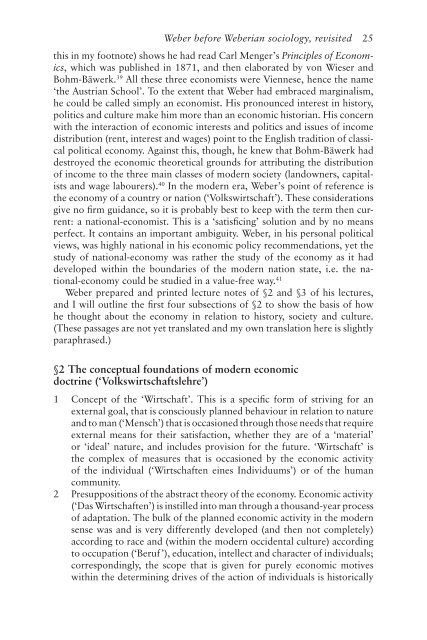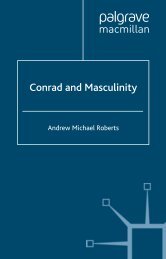Understanding Weber
Understanding Weber
Understanding Weber
Create successful ePaper yourself
Turn your PDF publications into a flip-book with our unique Google optimized e-Paper software.
<strong>Weber</strong> before <strong>Weber</strong>ian sociology, revisited 25<br />
this in my footnote) shows he had read Carl Menger’s Principles of Economics,<br />
which was published in 1871, and then elaborated by von Wieser and<br />
Bohm-Bäwerk. 39 All these three economists were Viennese, hence the name<br />
‘the Austrian School’. To the extent that <strong>Weber</strong> had embraced marginalism,<br />
he could be called simply an economist. His pronounced interest in history,<br />
politics and culture make him more than an economic historian. His concern<br />
with the interaction of economic interests and politics and issues of income<br />
distribution (rent, interest and wages) point to the English tradition of classical<br />
political economy. Against this, though, he knew that Bohm-Bäwerk had<br />
destroyed the economic theoretical grounds for attributing the distribution<br />
of income to the three main classes of modern society (landowners, capitalists<br />
and wage labourers). 40 In the modern era, <strong>Weber</strong>’s point of reference is<br />
the economy of a country or nation (‘Volkswirtschaft’). These considerations<br />
give no firm guidance, so it is probably best to keep with the term then current:<br />
a national-economist. This is a ‘satisficing’ solution and by no means<br />
perfect. It contains an important ambiguity. <strong>Weber</strong>, in his personal political<br />
views, was highly national in his economic policy recommendations, yet the<br />
study of national-economy was rather the study of the economy as it had<br />
developed within the boundaries of the modern nation state, i.e. the national-economy<br />
could be studied in a value-free way. 41<br />
<strong>Weber</strong> prepared and printed lecture notes of §2 and §3 of his lectures,<br />
and I will outline the first four subsections of §2 to show the basis of how<br />
he thought about the economy in relation to history, society and culture.<br />
(These passages are not yet translated and my own translation here is slightly<br />
paraphrased.)<br />
§2 The conceptual foundations of modern economic<br />
doctrine (‘Volkswirtschaftslehre’)<br />
1 Concept of the ‘Wirtschaft’. This is a specific form of striving for an<br />
external goal, that is consciously planned behaviour in relation to nature<br />
and to man (‘Mensch’) that is occasioned through those needs that require<br />
external means for their satisfaction, whether they are of a ‘material’<br />
or ‘ideal’ nature, and includes provision for the future. ‘Wirtschaft’ is<br />
the complex of measures that is occasioned by the economic activity<br />
of the individual (‘Wirtschaften eines Individuums’) or of the human<br />
community.<br />
2 Presuppositions of the abstract theory of the economy. Economic activity<br />
(‘Das Wirtschaften’) is instilled into man through a thousand-year process<br />
of adaptation. The bulk of the planned economic activity in the modern<br />
sense was and is very differently developed (and then not completely)<br />
according to race and (within the modern occidental culture) according<br />
to occupation (‘Beruf ’), education, intellect and character of individuals;<br />
correspondingly, the scope that is given for purely economic motives<br />
within the determining drives of the action of individuals is historically




